- Home
- Caroline Anderson
The Secret in His Heart Page 4
The Secret in His Heart Read online
Page 4
It was irrelevant, he told himself again. That was then, this was now, this was Connie on her own, fulfilling a lost dream. God knows what her motives were, but he was pretty sure she hadn’t examined them in enough detail or thought through the ramifications. Somehow or other he had to talk her out of it, or at the very least try. He owed it to Joe. He’d promised to take care of her, and he would, because he kept his promises, and he’d keep this one if it killed him.
Assuming she’d let him, because her biological clock was obviously ticking so loud it was deafening her to reason. And as for his crazy reaction, that absurd urge to give her his baby—and without the benefit of any damn turkey baster—
Swearing viciously under his breath, he pulled up in a slew of gravel, and immediately he could hear Saffy yipping and scrabbling at the gate.
‘Do you reckon she can smell the shopping?’ Connie asked, smiling tentatively at him over the top, and he laughed briefly and turned his attention to the shopping bags, wondering yet again how on earth he was in this position. Why she hadn’t warned him over the phone, said something, anything, some little hint so he hadn’t been quite so unprepared when she’d just come out with it, though quite how she would have warned him—
‘Probably,’ he said drily. ‘I think I’d better put this lot away in the fridge pronto. I take it she can’t open the fridge?’
‘She hasn’t ever done it yet.’
‘Don’t start now,’ he said, giving the dog a level stare immediately cancelled out by a head-rub that had her shadowing him into the kitchen.
Connie followed him, too, hesitating on the threshold. ‘James, I’m really sorry. I didn’t mean to put you in a difficult position.’
He paused, his hand on the fridge door, and looked at her over his shoulder. ‘You didn’t,’ he said honestly. ‘Joe did. It was his idea. You were just following up on it.’
‘I could have let it go.’
‘So why didn’t you?’
Her smile was wry and touched with sadness. ‘Because I couldn’t,’ she answered softly, ‘not while there was any hope,’ and he straightened up and shut the fridge and hugged her, because she just looked so damned unhappy and there was nothing he could do to make it better.
No amount of taking care of her was going to sort this out, short of doing what she’d asked, and he wasn’t sure he would ever be able to do that, despite that visceral urge which had caught him off guard. Or because of it? Just the thought of her pregnant with his child...
He let her go, easing her gently away with his hands on her shoulders and creating some much-needed distance between them, because his thoughts were suddenly wildly inappropriate, and the graphic images shocked him.
‘Why don’t you stick the kettle on and we’ll have a cup of tea, and then we can take Saffy for a walk and go to the pub for supper.’
‘Are we still going? I thought you’d just been shopping.’
He shrugged. ‘I didn’t bother to get anything for tonight. The pub seemed like a good idea—unless—is Saffy all right to leave here while we eat?’
She stared at him for a second, as if she was regrouping.
‘Yes, she’s fine. I’ve got a big wire travelling crate I use for her—it’s a sort of retreat. I leave the door open all day so she can go in there to sleep or get away from it all, and I put her in there at night.’
‘Because you don’t trust her?’
‘Not entirely,’ she said drily. ‘Still early days, and she did pinch the steak and the sausages.’
‘The crate it is, then.’ He smiled wryly, then glanced at his watch. ‘Why don’t we bring your luggage in and put it in your room while the kettle boils? I would have done it before but things ran away with us a little.’
Didn’t they just? she thought.
He carried the dog’s crate, she carried her overnight bag and the bag of stuff for Saffy—food, toys, blanket. Well, not a blanket, really, just an old jumper of Joe’s she’d been unable to part with, and then when Saffy had come home she’d found a justification for her sentimental idiocy.
‘Can we leave the crate down here?’ she asked. ‘She’ll be fine in the kitchen, she’s used to it.’
‘Sure. Come on up, I’ll give you a guided tour. It’ll take about ten seconds. The house isn’t exactly enormous.’
It wasn’t, but it was lovely. There were doors from the entrance hall into the ground floor living space, essentially one big L-shaped room, with a cloakroom off the hallway under the stairs, and the landing above led into three bedrooms, two doubles and a single, and a small but well-equipped and surprisingly luxurious bathroom.
He showed her into the large bedroom at the front, simply furnished with a double bed, wardrobe and chest of drawers. There was a pale blue and white rug on the bare boards between the bed and the window, and on the edge of it was a comfy armchair, just right for reading in. And the bed, made up in crisp white linen, sat squarely opposite the window—perfect for lying there drinking early morning tea and gazing out to sea.
She crossed to the window and looked left, over the river mouth, the current rippling the water. The window was open and she could hear the suck of the sea on the shingle, the keening of the gulls overhead, and if she breathed in she could smell the salt in the air.
‘Oh, James, it’s lovely,’ she sighed.
‘Everyone likes this room.’ He put her bag down and took a step towards the door. ‘I’ll leave you to settle in.’
‘No need. I travel light. It’ll take me three seconds to unpack.’
She followed him back out onto the landing and noticed another flight of stairs leading up.
‘So what’s up there?’ she asked.
‘My room.’
He didn’t volunteer anything else, didn’t offer to show it to her, and she didn’t ask. She didn’t want to enter his personal space. Not under the circumstances. Not after her earlier speculation about his love life. The last thing she needed was to see the bed he slept in. So she didn’t ask, just followed him downstairs, got her walking boots out of the car and put them on.
‘In your own time, Slater,’ she said lightly, and he gave her one of those wry smiles of his and got off the steps and led her and Saffy out of the gate.
CHAPTER THREE
SHE PUT SAFFY on a lead because she didn’t really want to spend half the evening looking for her if she ran off, but the dog attached herself to James like glue and trotted by his side, the lead hanging rather pointlessly across the gap between her and Connie.
Faithless hound.
‘So, where are we going?’ she asked, falling in beside them.
‘I thought we could go along by the river, then cut inland on the other side of the marshes and pick up the lane. It’ll bring us out on the sea wall from the other direction. It’s about three miles. Is that OK?’
‘Sounds good.’
The path narrowed on top of the river wall, and she dropped back behind him, Saffy still glued to his heels, and in the end she gave him the lead.
‘You seem to have a new friend,’ she said drily, and he glanced down at the dog and threw her a grin over his shoulder.
‘Looks like it. Is that a problem?’
‘No, of course not,’ she said promptly. ‘I’m glad she likes you. She does seem to like men, I expect because she’s been used to them looking after her out in Helmand, but she’ll have to get over it when we go home tomorrow. I hope it won’t unsettle her.’
‘Do you think it might?’
‘I don’t know. I hope not. She’s doing so well.’
‘Apart from the thieving,’ he said drily, and she gave a guilty chuckle.
‘Yeah, well. Apart from that.’
They walked in silence for a while by the muddy shallows at the edge of the river, and then as th
ey turned inland and headed uphill, he dropped back beside her and said, ‘So, how was Afghanistan? You haven’t really told me anything about it.’
‘No. It was a bit strange really. A bit surreal, but I’m glad I went. The facilities at Camp Bastion are fantastic. The things they do, what they achieve—for a field hospital it’s unbelievable. Did you know it’s got the busiest trauma unit in the world?’
‘I’m not surprised. Most of them aren’t in an area that has conflict.’
‘No. No, they aren’t. And I found that aspect really difficult.’
‘Because of Joe?’
She nodded. ‘Sort of. Because of all of them, really. I had second thoughts about going, after he died. I didn’t know how I’d feel facing the stark reality of it, but I realised when the first wave of grief receded that I still wanted to go. There was so much I wanted to try and understand, such as why it was necessary, why he’d gone in the first place, what he’d been trying to achieve.’
‘And did you?’
‘No. No, I still don’t understand, not really. I don’t think I ever will and I’m not sure I want to. People killing each other, maiming each other—it all seems so pointless and destructive. There must be a better way than all this senseless violence.’
‘It must have been really hard for you, Connie,’ he said, his voice gentle. ‘Very close to home.’
She nodded slowly, remembering the shock of seeing the first casualties come in, the realisation that this was it, this was what really happened out there. ‘It was. I’d seen videos, had training, but I hadn’t really understood what it was like for him until then. Seeing the injured lads there, though, fighting so hard to save them—it brought it all home to me, what he’d gone through, the threat he’d faced every day, never knowing when or if it might happen to him. That was tough.’
‘I’m sure. He mentioned you were talking about going. I got the feeling he didn’t like it much.’
‘No, he didn’t. I don’t think he wanted to be worrying about me while he was trying to do his job, and he’d tried to put me off when I joined the Territorial Army as a volunteer doctor four years ago, but I thought, if Joe can do it, so can I. Not in the same way, but to do something, to do some good—and I’m glad I did, even though it was tough, because it’s an incredible experience as a doctor.’
They fell silent for a while, then she went on, ‘It’s amazing what they can do there, you know, saving people that in civilian medicine we simply couldn’t save because we just don’t get to them fast enough or treat them aggressively enough when we do.’
He followed her lead and switched the conversation to practical medical aspects. ‘So what would you change about the way we do things here?’
‘Speed. Blood loss. That’s the real killer out there, so stopping that fast is key, and transfusions. Massive transfusions. We gave one guy a hundred and fifty units of whole blood, plasma, platelets—you name it. No mucking about with saline and colloids, it’s straight in with the blood products. And total body scans, the second they’re stable enough to go, so they can see exactly what’s wrong and treat it. We should really be doing that with multiple trauma, because it’s so easy to miss something when there’s loads going on.’
He nodded. ‘If only we could, but we just don’t have the resources. And as for the time issue—we lose people so often because they just get to us too slowly.’
‘Oh, they do. We have the golden hour. They have the platinum ten minutes—they fly out a consultant-led team, scoop them up and bring them back and they’re treating them aggressively before the helicopter’s even airborne. Every soldier carries a tourniquet and is trained to use it in an emergency, and it’s made so much difference. They save ninety per cent of multiple trauma patients, where in the rest of the world we save about twenty per cent. And I realised that if Joe died despite everything they were able to throw at him, it was because he was unsaveable. That was quite cathartic.’
He nodded slowly. ‘I can imagine it would be. So, will you go again?’
‘No,’ she said softly. ‘I’m glad I went, because it helped me let go of Joe, but I’ve done it now, and I’ve said goodbye and I’ve left the TA. I need to move on. I have other goals now.’
A baby, for one.
He went quiet for a while, then turned his head and looked at her searchingly.
‘So how come you aren’t working at the moment?’
She gave him a fleeting smile and looked away again. ‘I wondered if you’d ask that. I could blame it on Saffy, say she’d taken a lot of time, a lot of training, and in a way it’s true, but really she’s just an excuse. I guess I was—I don’t know... Taking time out to regroup, maybe? I worked solidly for the first year after he died, and I didn’t give myself time to think, and then I went off to Afghanistan and put even more pressure on myself. That was a mistake, and by the time I got back after Christmas I was wiped. I needed time just to breathe a bit and work out where I go from here. A bit of a gap year, in a way. So I took it—or a few months, anyway. Just to try and make some sense of it.’
She made herself meet his eyes again, and found a gentle understanding in them.’Yeah. I did that after Cathy died. Took a gap year and grabbed the world by the throat, trying to make sense of it.’
‘Did it help?’
He thought back to the aching emptiness, the people he’d met who’d scarcely registered in the haze of grief that had surrounded him. ‘No. I don’t know. Maybe. Maybe not. It took me away from it, but when I came back it was still there, lurking in wait. The grief, the loneliness.’
It was the closest he’d ever got to talking about Cathy, so she pushed a little more, to see if he’d open up further.
‘She had cancer, didn’t she?’
The shadows in his eyes darkened. ‘Yes. One minute she was fine, the next she was dying.’
Connie felt her heart ache for him. ‘Oh, James. It must have been dreadful watching that.’
He could see her now, the image crystal clear, pale as a ghost against the crisp white sheets, trying to smile at him, the small, neat curve of her doomed pregnancy so prominent in that thin frame.
‘It was,’ he said simply.
They reached the lane then, and he led the way, walking in single file for a while, facing the oncoming traffic.
Convenient, she thought, since it meant they couldn’t talk. Far from opening up, he’d shut down again, so she left him alone, just following on behind until they reached the sea wall again and turned left towards the harbour and the little community clustered around the river mouth.
As they drew nearer they passed a house, a sprawling, ultra-modern house clad in cedar that had faded to silver. It was set in a wonderful garden on the end of the little string of properties, and there were children playing outside on the lawn, running in and out of a sprinkler and shrieking happily, and a woman with a baby on her hip waved to him.
He waved back, and turned to Connie as they walked on. ‘That’s Molly. She and her husband used to own my house. They outgrew it.’
‘I should think they did. There were a lot of children there.’
‘Oh, they’re not all hers,’ he said with a fleeting smile. ‘The baby’s theirs and she’s got a son of about twelve, I think, and they’ve got another little one. The others will be her sister-in-law’s. They didn’t want to move away from here, but with two children and room for her painting they were struggling for space, as you can imagine, and then that house came on the market and David pounced on it.’
‘It’s an amazing house. They must have had a stash of cash somewhere or a lottery win.’
He chuckled, the sombre mood seeming to slip away. ‘Oh, it didn’t look like that when they bought it, but I don’t think they’re exactly strapped. David’s a property developer and he part-owns a chain of boutique hotels in Australia. His father�
�s a local building contractor, and they extended the house massively. She’s got a great studio space and gallery there, and they’ve done a lovely job of it. They’re nice people. Good neighbours.’
She wondered what it must be like to live in one place long enough to get to know your neighbours. She’d moved so much with Joe, shifting from one base to another, never putting down roots, and it hadn’t been much better in her childhood. She envied James the stability of his life, even if he was alone. Not that she knew that for sure, she reminded herself.
He cut down off the sea wall to his garden gate and held it for her. ‘Right, I need a shower, and then shall we go over to the pub? I haven’t had anything but those cookies since breakfast and I’m starving.’
‘Me, too, but I need to feed the dog. You take the bathroom first.’
‘No need. I’ve got my own upstairs.’
She felt the tension she’d been unaware of leave her. So, no sharing a bathroom, no awkward moments of him tapping on the door or her being caught in the hall with dripping hair.
Heavens, what was wrong with her? This was James!
‘Half an hour?’ he suggested.
‘That’s fine. I’ll feed Saffy first.’
He disappeared up the stairs, and she fed the dog and put her in the crate, not taking any chances while she was getting ready to go out. This would not be the diplomatic time to find out that Saffy could, indeed, open the door of the fridge.
She put her hair up in a knot and showered quickly, then contemplated her clothes. She hadn’t really brought anything for going out, it hadn’t occurred to her, but it was only the pub and she’d got a pretty top that would do. She put it on over her cropped jeans, let her hair down and then put on some makeup. Not much, just a touch of neutral eyeshadow, a swipe of mascara and a clear, shimmery lipgloss. Just enough to hide behind.
‘Stupid woman,’ she muttered. They were going to the local pub for a quick meal to make up for the fact that Saffy had stolen the steak. It wasn’t an interview, and it sure as hell wasn’t a date.

 From Heartache to Forever
From Heartache to Forever A Single Dad to Heal Her Heart
A Single Dad to Heal Her Heart Healing Her Emergency Doc
Healing Her Emergency Doc Tempted by the Single Mom
Tempted by the Single Mom Tempted By The Single Mom (Yoxburgh Park Hospital)
Tempted By The Single Mom (Yoxburgh Park Hospital) The Baby Swap Miracle
The Baby Swap Miracle The Tycoon's Instant Family
The Tycoon's Instant Family Their Christmas Family Miracle
Their Christmas Family Miracle Valtieri's Bride & A Bride Worth Waiting For: Valtieri's BrideA Bride Worth Waiting For
Valtieri's Bride & A Bride Worth Waiting For: Valtieri's BrideA Bride Worth Waiting For Mother of the Bride
Mother of the Bride Their Meant-to-Be Baby
Their Meant-to-Be Baby Best Friend to Wife and Mother?
Best Friend to Wife and Mother? Their Own Little Miracle
Their Own Little Miracle The Valtieri Marriage Deal
The Valtieri Marriage Deal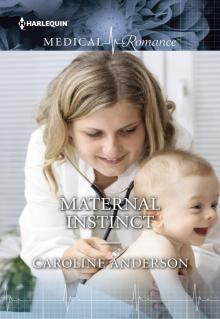 Maternal Instinct
Maternal Instinct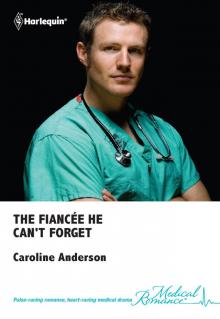 The Fiancé He Can't Forget
The Fiancé He Can't Forget From Christmas to Eternity
From Christmas to Eternity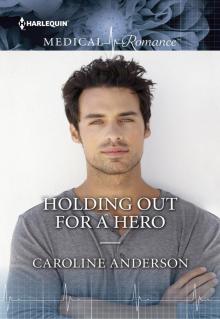 Holding Out For a Hero
Holding Out For a Hero Bound by Their Babies
Bound by Their Babies The Ideal Choice
The Ideal Choice SNOWED IN WITH THE BILLIONAIRE
SNOWED IN WITH THE BILLIONAIRE The Perfect Christmas
The Perfect Christmas The Baby Question
The Baby Question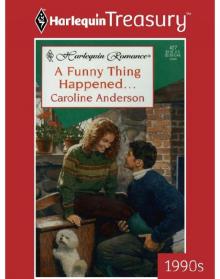 A Funny Thing Happened...
A Funny Thing Happened... Practically Perfect
Practically Perfect A Wife and Child to Cherish (Audley Memorial Hospital)
A Wife and Child to Cherish (Audley Memorial Hospital) Taken For Granted
Taken For Granted The Midwife's Longed-For Baby
The Midwife's Longed-For Baby A Special Kind of Woman
A Special Kind of Woman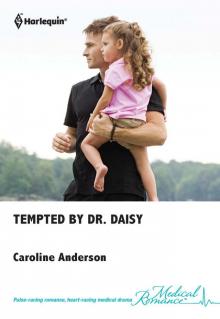 Tempted by Dr. Daisy
Tempted by Dr. Daisy A Mother by Nature
A Mother by Nature Accidental Rendezvous
Accidental Rendezvous His Very Own Wife and Child
His Very Own Wife and Child The Surgeon's Miracle
The Surgeon's Miracle Their Miracle Baby
Their Miracle Baby The Valtieri Baby
The Valtieri Baby The Single Mom and the Tycoon
The Single Mom and the Tycoon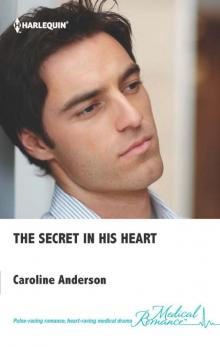 The Secret in His Heart
The Secret in His Heart The Real Fantasy
The Real Fantasy Just Another Miracle!
Just Another Miracle!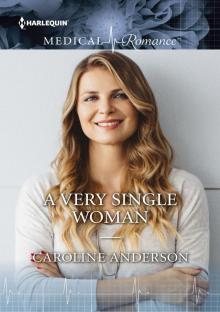 A Very Single Woman
A Very Single Woman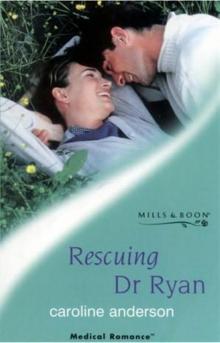 Rescuing Dr Ryan
Rescuing Dr Ryan St. Piran's: The Wedding of The Year
St. Piran's: The Wedding of The Year Accidental Seduction
Accidental Seduction One Step At A Time
One Step At A Time A Perfect Hero
A Perfect Hero